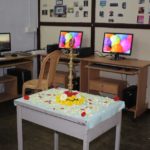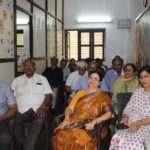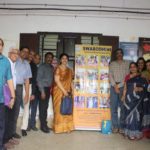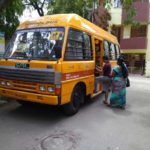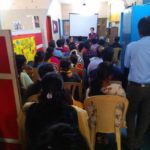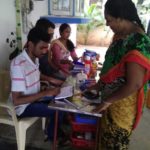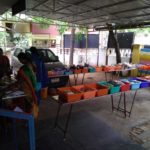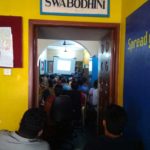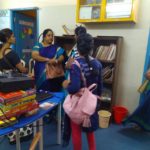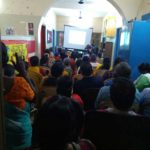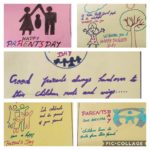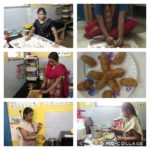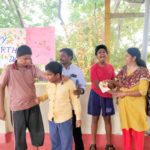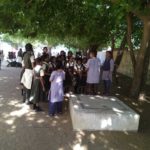July 2019 Newsletter

Dear All
The 73rd Indian Independence day has just gone by, while many of us take day to day Independence for granted, in the world of special children this takes on a whole new meaning, in some cases a whole new life within a life. The month of July 2019 saw great many initiatives for our students starting with the inauguration of the Vocational Computer section with 3 HP computers donated by the Rotary Club, sharing of ABA (applied behavior analysis) methodology to improve learning comprehension by our in-house coordinator for Primary section – Subadeva Wesley during the parent teacher meet, a talk on the right diet for special children by Dr Avanti and of course the effusive energetic birthday celebrations – always a pleasure to be part of.
Without further ado – read “Samyojana – July Newsletter from Swabodhini”!
Best wishes,
Usha Pillai
Director
ushapillai@swabodhiniautism.org
Donation Of Computers By Rotary Club Of Madras, T.Nagar
We thank the members of Rotary Club of Madras, T.Nagar for donating computers for Swabodhini Vocational Training Centre at Guru Nanak College, Velachery.
Swabodhini is offering technical training programs specifically designed to advance professional skills for young adults with autism.
Currently, the Vocational Training at Swabodhini GNC campus focuses on training students with special needs on Computer and Office Administration. At present, we have seven students enrolled in the course.
The programs are instructor-led with hands-on training on real-life applications, which will mould the students to work real-time in an office environment.
The computer and office administration is a 12-month course, accredited by Guru Nanak College (Autonomous).
Course Curriculum is planned in such a way that it paves the way for various employment opportunities.
Course contents include:
On successful completion, students are issued certificates, which will enable them to be placed for employment. Internship in offices and open employment opportunities are regularly looked out for students.
Employing special children offers a chance for employers to bring diversity into their workplace.
Students with disabilities can contribute to their societies when they receive the right kind of support.
Donation Of Computers By Rotary Club Of Madras, T.Nagar
We thank the members of Rotary Club of Madras, T.Nagar for donating computers for Swabodhini Vocational Training Centre at Guru Nanak College, Velachery.
Swabodhini is offering technical training programs specifically designed to advance professional skills for young adults with autism.
Currently, the Vocational Training at Swabodhini GNC campus focuses on training students with special needs on Computer and Office Administration. At present, we have seven students enrolled in the course.
The programs are instructor-led with hands-on training on real-life applications, which will mould the students to work real-time in an office environment.
The computer and office administration is a 12-month course, accredited by Guru Nanak College (Autonomous).
Course Curriculum is planned in such a way that it paves the way for various employment opportunities.
Course contents include:
On successful completion, students are issued certificates, which will enable them to be placed for employment. Internship in offices and open employment opportunities are regularly looked out for students.
Employing special children offers a chance for employers to bring diversity into their workplace.
Students with disabilities can contribute to their societies when they receive the right kind of support.
Visit To Big Bazaar
Big Bazaar, a leading hypermarket store in the country observes ‘Quiet Hour’ every Tuesday to create awareness on Autism Spectrum disorder (ASD). Shoppers on the Autism spectrum require a place with reduced physical stimulus & a sensitized environment.
A unique shopping environment is created with:
We wanted our students to experience the ‘Quiet Hour’ at Big Bazaar. Thirteen students from Retail and Culinary program visited the Big Bazaar at Phoenix market city, Velachery on July 23rd 2019; part of the experiential visits.
During the visit, students were able to
Students also got their items billed and tendered exact change at the billing counter on their own.
Visiting Big bazaar gave these children a practical knowledge of what they have been learning in retail skill training course plus the experience of shopping at a mall.
Parents And Teachers Meet
The parents and teachers meet held on July 20th at Swabodhini Thiruvanmiyur campus to discuss the child’s progress at school and find solutions to academic or behavioral problems.
The meet kicked off with the introduction of our new director, Mrs.UshaPillai. The teachers discussed individualized education and therapy plan with their respective parents. Parents were also excited to shop groceries along with their children from the mobile Swayam shop at the campus.
Food And Nutrition Guidelines For Children With Special Needs - By Dr.Avanti Prabhakar
Dr.Avanti Prabhakar is an assistant professor at JBAS College for Women, one of the leading nutritionist with particular focus on the ‘nutritional needs for children with special needs’.
Here is the gist of the lecture by Dr.Avanti held on July 20th at Swabodhini, Thiruvamiyur campus.
People with ASD often have behavioral issues, which can affect eating habits and food choices, leading to the following health concerns.
Each child is unique, and hence, individualized nutritional therapy can make a big difference to children with autism.
The above issues are addressed through:
Few practical tips by Dr.Avanti:
Differential Reinforcement
When we talk about differential reinforcement, we are usually talking about its application to challenging behavior. In this case, differential reinforcement consists of two parts: (1) withholding reinforcement for the challenging behavior, and (2) reinforcing appropriate replacement behavior, an incompatible behavior, or absence of the challenging behavior
There are four forms of differential reinforcement:
Brief discussion on DRA
DRA – When applying a DRA, withhold reinforcement for challenging behavior and reinforce appropriate replacement behavior. We recommend the use of DRAs with children because they simultaneously reduce problem behavior and reinforce a new and appropriate skill. However, it is essential to remember that appropriate replacement skills are unlikely to occur unless they are systematically taught and prompted, in addition to being reinforced. You should also try to teach an alternative behavior that is easier for the child to engage in when compared to the challenging behavior.
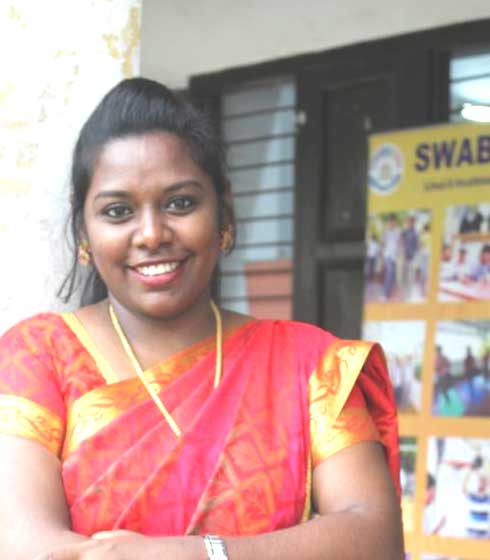
By Suba Wesley, Co-Ordinator Special Education
Schedule of Reinforcement – DRA
| Withholding Reinforcement | Proving Reinforcement |
| Withhold reinforcement for problem behavior | Reinforce appropriate replacement behavior |
| Ms. Anni withholds attention for calling out during circle time | Ms. Anni provides high-quality attention for raising hand during circle time |
Few more examples:
It is not enough to redirect the child to a different behavior at random. That is not implementing a DRA technique. If the child is mouthing toys to get sensory stimulation and you block the mouthing and give the child a book to read, how does that address their sensory need? It does not. What will happen is that the child will try to mouth the book, or they will engage with it for a few seconds and then throw it down.
It also is not enough to redirect the child to a functionally similar alternative behavior with no reinforcement. While the behavior is inappropriate or maladaptive from our point of view to the child the behavior they are engaging in works, it is useful, and it is efficient. It is only to us, as clinicians and parents, that the behavior is deemed unacceptable. To bring about lasting behavior change, you must reinforce the alternative behavior and make it more appealing than the inappropriate behavior. You always want to create motivation for the child to engage in the more appropriate behavior.
Parents Day Celebration
A day to appreciate all parents in all parts of the world for their selfless commitment, lifelong sacrifice and hardship they undergo in raising their children. Students of Swabodhini celebrated Parents Day on July 28th, 2019. Each student, with the help of their teachers, gifted a hand-made greeting card for their parent. Retail and Culinary students had prepared ‘Sweet Kozhukattai’ as a token of love for their parents.
July Birthday Celebrations
Students who celebrated their birthday in July are Danish Ismail, J.S.Thaarini, Ram Subramaniam, A.G.Vigneshwaran and Khaja Sheriff.
We also had students from Lotus foundation for the celebration.
Gayathri, student of Lotus Foundation celebrated her birthday with us, thereby making it extra special. Lotus foundation gifted hand-made paper bags to students who celebrated their birthdays.
Short skit based on a moral story was enacted by students followed by a dance performance and cake cutting.
Inclusive Education
Ms.Kala primary teacher at GNC Velachery in her own words shares her practical experience and the visible impact she observed in the students of Swabodhini as a result of inclusive education.
Inclusion in education at GNC encourages interaction between Students of Swabodhini and Guru Nanak school students.
Observations made by Ms.Kala that students of Swabodhini are learning
- Many new ideas from their peers
- Showing interest in new hobbies
- Communication and gestures
- To Participate in group conversations and activities (like Mushroom cultivations)
- To Eat together and share food
- To Celebrating birthdays and festivals together
Inclusive education has undoubtedly given the students of Swabodhini has given a tremendous amount of confidence. We once again thank the management of Guru Nanak College for supporting us with classrooms.

By Ms. Kala, Primary Teacher, GNC
Thank You!

